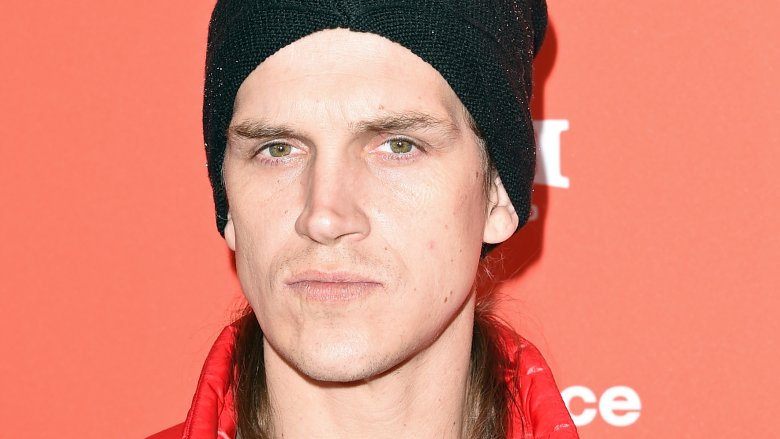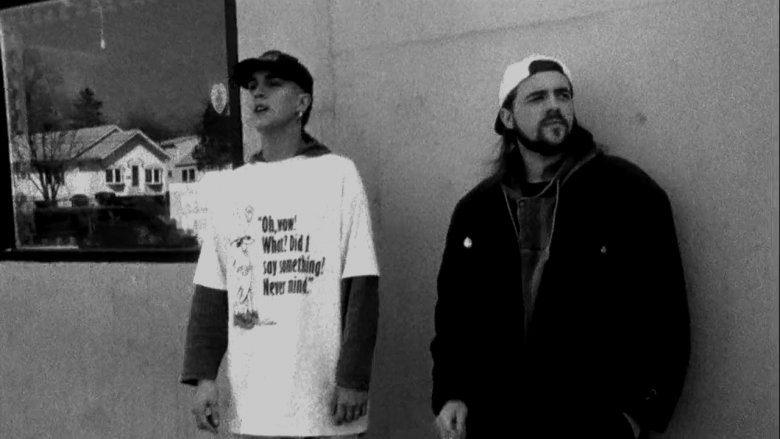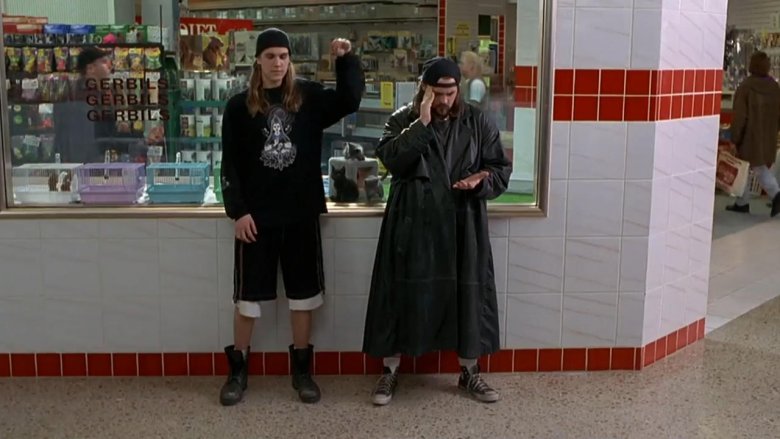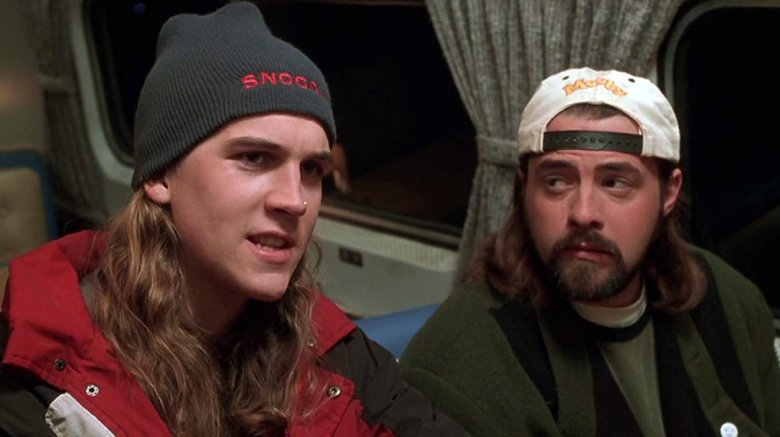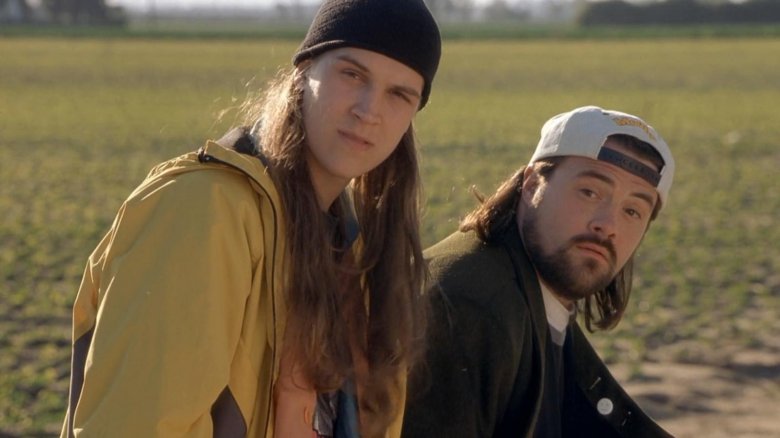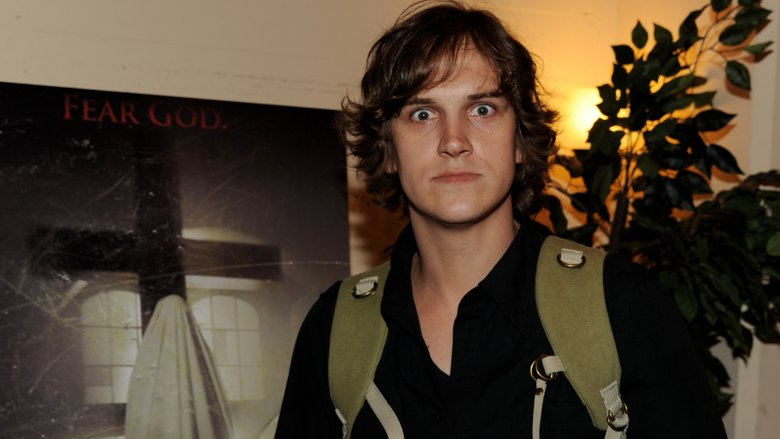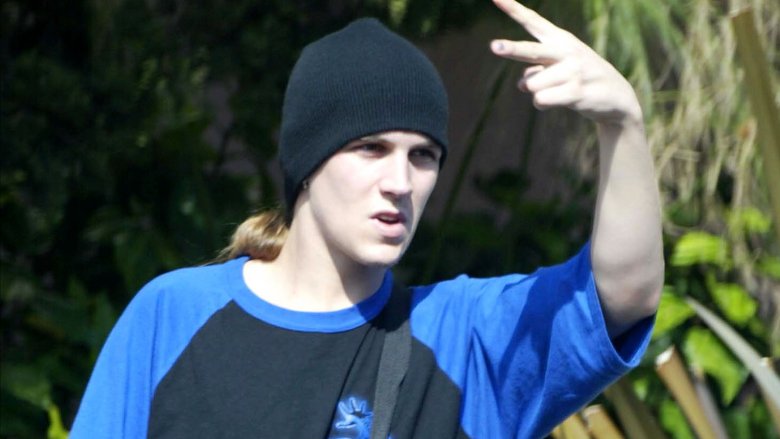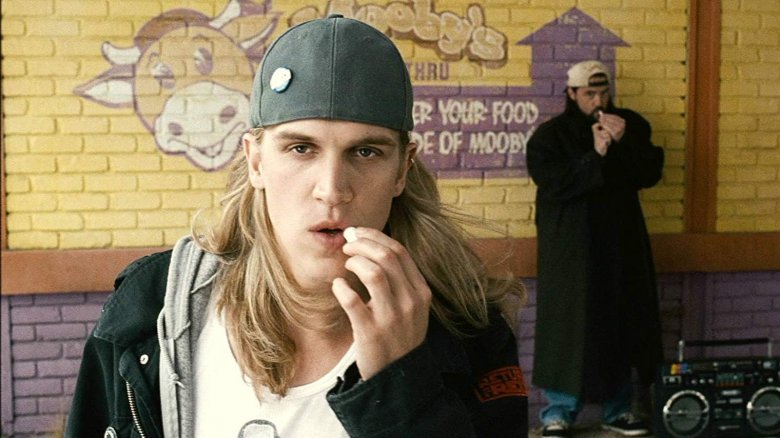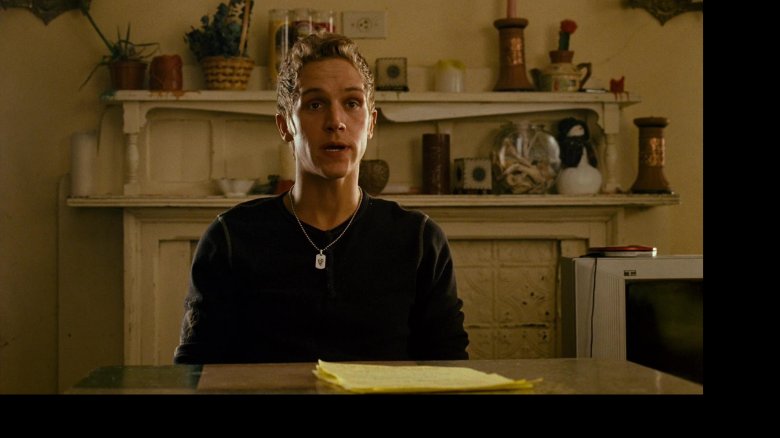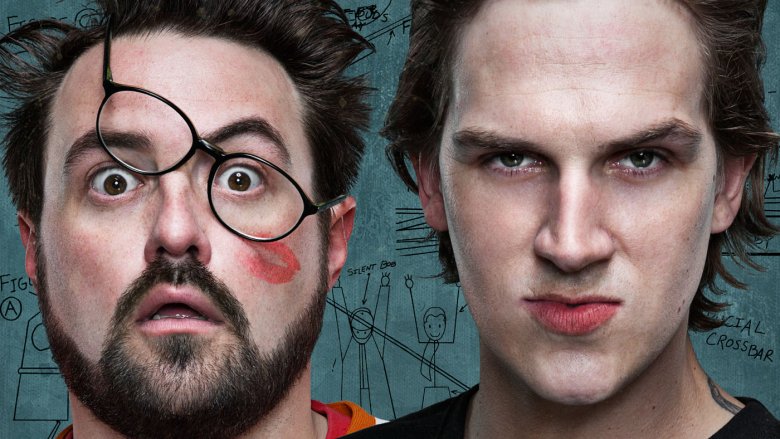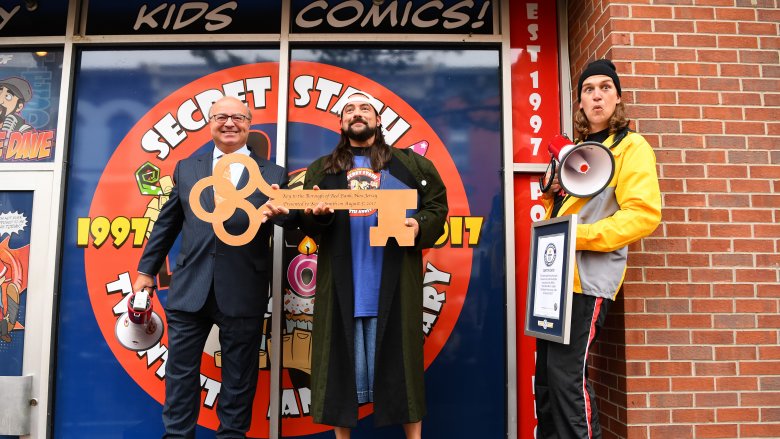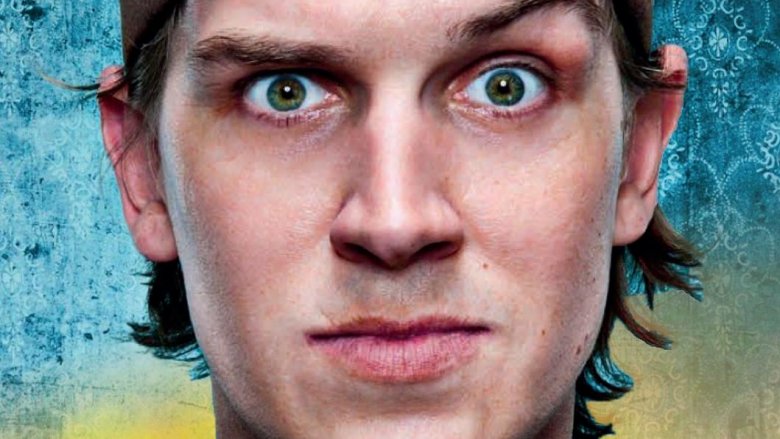The Untold Truth Of Jason Mewes - Exclusive
Jason Mewes has become known the world over for making people laugh as his character Jay, teaming up with childhood pal Kevin Smith to play the famous stoner duo Jay and Silent Bob. The pair is set to take the spotlight again with Jay and Silent Bob Reboot, alongside a "Reboot Roadshow" tour serving as something of a victory lap as they mark the 25th anniversary of their debut. But it hasn't always been all lighthearted fun in the life of this actor, filmmaker, and podcaster.
While Mewes cracked audiences up with his weed, coke, and beer-related antics in Smith's Clerks and beyond, he spent what should have been the best years of his ascendant career falling increasingly into addiction. While his persona made him shine on-screen, drugs were quietly causing great damage in his life, making him a target for tabloid fodder, endangering his safety, and derailing his career.
Fortunately, Mewes was able to turn the tables on his addictions in the early 2000s, starting a process of sober living that he's continued to this day. It's a remarkable story, and he was kind enough to tell us all about it.
Youth and young Mewes-hood
According to Kevin Smith, writing about his experiences with Mewes' addictions in the multi-part story "Me and My Shadow," Mewes' eventual slide into drug dependency was foreshadowed by a tragic family history. As Smith put it, Mewes was "Born the son of a heroin abuser, [and] spent most of his childhood raised by an aunt while his Mother fed her jones or spent years in jail."
Despite this home situation, Mewes was essentially living straight-edge when Smith first came to know of him, growing up with a few years' age gap between them in the small town of Highlands, New Jersey. When Mewes was in high school, according to Smith, he was known for advocating a lifestyle so clean that it was downright quaint — free of booze, narcotics, and even romance.
Things can change pretty quickly when you're a teenager, though, and when the time came to shoot Clerks, Mewes had morphed into an enthusiastic drinker and pot smoker, chasing girls and good times with profane aplomb. He was, according to Smith at least, essentially playing himself in the movie — Smith's directorial debut, and the friends' first collaboration as Jay and Silent Bob.
But while all the beers and bud and pontificating upon snoochie-boochies was, on-screen at least, often funny as hell, the real-life Mewes was on a path that threatened to derail his whole life and career in the years to come.
Salad years
For years after the success of Clerks, Mewes lived an intriguing dual lifestyle. He had a foot in the film industry, beating back producers' concerns to continue playing his Jay role in the studio-backed follow-up, Mallrats. In that and the movies that followed, he was a charismatic figure of increasing cult notoriety, an irreverent Cheech and/or Chong-type for the modern era. But that notoriety didn't necessarily translate into a stacked bank account, leaving Mewes to continue working regular jobs when filming wrapped.
"I came home from Mallrats and started delivering pizza and doing construction with my buddy," Mewes said. "And then we did Chasing Amy. [Kevin Smith was] like, 'I wrote one scene for us in Chasing Amy.' And then I did Chasing Amy, and I went back to delivering pizza and doing construction and stuff."
"I worked a regular job for years," Mewes continued. "It really wasn't until after Dogma that I stopped working construction and delivering pizza."
Also complicating things:
Jason Mewes begins to use
While Jason Mewes was tracing an ascendant path through Hollywood, his goofball charisma was masking a growing problem. Namely, the drug use was starting to become a lot less of a funny character quirk and more of a liability, especially as he shifted from pot and pilsners toward addictive narcotics — heroin, cocaine, and even crack.
When Mewes began shooting heroin, following the same path that had apparently led his mother to a devastating AIDS diagnosis, Smith began working to get Mewes off the opiates, giving him rides to methadone clinics. As recognizable personalities, they drew stares — as Smith would later put it, "Stoners are cute; junkies are sad."
It wasn't Hollywood pressure that made him dip further into using drugs. "I started using drugs in Jersey. It definitely isn't a Hollywood thing," Mewes said. "It definitely isn't a movie thing, or anything. I definitely feel I've started drinking, if anything, more, but that was more because I wanted to go out, and there's lots of fun clubs."
As Mewes put it, in the film industry, "Opiates and heroin and painkillers and stuff is taboo," which allowed Mewes to keep the extent of his drug usage relatively private for some time. To viewers, this made his deepening dependency on drugs during the late '90s slightly less visible. On screen, he was serving up the goods, and if he was falling asleep on set in the middle of takes while shooting Dogma — well, audiences didn't notice.
Risky business
According to Kevin Smith, Jason Mewes' drug usage had reached levels that were both testing their friendship and threatening Mewes' safety by the time Dogma had wrapped. Smith would later write that Mewes was making upwards of six 100+ mile trips a day in his truck to Newark to acquire heroin, and acquiring track marks from the frequency of his injections.
On top of everything else, Mewes' habits were apparently destroying his teeth — a major problem for a working actor, especially one who was soon to be the focus of his own studio movie. But that could be considered the least of his worries, compared to the actor's trouble with the law. At one point, he reportedly rolled his truck through a traffic stop while under the influence, colliding with the car of an off-duty police officer. Then he was arrested for heroin possession after being stopped by police for driving around with a deployed airbag, an incident which was later used for yuks in a scene in Clerks II.
Striking back
After Dogma, circumstances would occasionally compel Mewes to check into rehab, but not the sort of programs that would stick — not for him, not at the time.
As Kevin Smith tells the story, during pre-production of Jay and Silent Bob Strike Back, key members of the production (himself included) had to spend an inordinate amount of time keeping Mewes occupied and off drugs. But even when he wasn't using, the drugs remained a fixation, leading to a blow-up between Mewes and Smith that led Smith to decide to cancel the movie. In his mind, he wrote, it would be better to cut their losses than get deep into production and have Mewes fall off the wagon. As Smith recalls the incident, he told Mewes, "You can do all the f***ing dope you want now, because we're stopping the movie."
For fans of the duo on-screen, the whole episode is a bracing dose of reality, showing that while the movie may have been lighthearted, the backdrop of its production was anything but. According to Smith, Mewes managed to stay clean enough to finish production, but was back to doing oxycontin within hours after shooting his last scene on the film. During the months of post-production, his tenuous support system otherwise occupied, he reportedly lost 30 pounds as a result of smoking crack.
Rumors of my death...
As years of watching Intervention can all but prove to you, people don't get off drugs until they're ready to get off drugs, and they're often not ready to do that until it feels like literally the only option they have left. For Jason Mewes, this moment arrived in 2001.
Returning to drug usage after wrapping Jay and Silent Bob Strike Back brought about incidents that included being caught having heroin mailed to a hotel during a press junket and stealing money from Smith. Additionally, a warrant was issued for his arrest in his home state of New Jersey after he failed to show up for a court date, thereby violating his probation from a previous arrest for heroin possession.
The legal issue, coupled with a reputation that was now hard to deny, led Smith to decline to cast Mewes in his sixth film, Jersey Girl, which was mostly shot around Highlands, New Jersey. Now knowing he'd be arrested if he ever attempted to return home, Mewes decided to turn himself in.
Mewes' return to New Jersey to face the authorities was presaged by the all-time indicator of a man living on the edge — a short-lived rumor that he had literally died.
Rehab sticks
For all its flaws, Hollywood is probably on the whole more capable of providing a support system for an addict than the typical American correctional facility. Fortunately, Jason Mewes didn't have to face incarceration. Instead of being locked away immediately upon turning himself in, he was given a choice: a year in jail, or six months of rehab, with probation to follow and penalties in store should he try to leave the rehab early.
"It wasn't like I stepped away from everything to be like, 'Hey, I need to clear my head from being in the Hollywood spotlight, or on the town or something,'" Mewes said. "It was literally just like, 'I need to try to take care of this problem I have, and I don't know how to do it besides going to turn myself in to the New Jersey court systems,' or what have you. And I just fell off the map."
It turns out, falling off the map was exactly the thing he needed to turn things around.
Setbacks
More than four years into Jason Mewes' first effort at going sober, he fell victim to a pitfall feared by many recovering heroin users: getting nostalgic in a bad way, thanks to legally-prescribed opiates.
"I had four and a half years almost, and then I relapsed," Mewes said. "And that was only because, it's not even like I went out and chased it. I had gotten hurt, and I got a shot of Demerol for the pain, and that sparked the whole thing back. 'Oh, I remember that feeling and I miss it.'"
"I relapsed again, and Kevin was like, 'You were doing so well. You had over four years. What happened?' I said, 'Look, I don't think I was sharing what was going on. When I felt that shot of Demerol and was feeling good, I didn't talk to someone. Like whoa, I'm scared. I felt that and I want to go back to that and stuff. And I wasn't accountable to anybody or talking to anyone.'"
Talking with Smith after his relapse, Mewes realized he needed to be accountable to something more than just himself, especially now that he'd just let himself down. He needed something like the conversation he and Smith were having at that moment. The idea came up to essentially keep the conversation going indefinitely... and invite the public to listen in.
Jay and Silent Bob Get Old
One of the more unique ways in which Mewes handled his sobriety after his relapse was to start a podcast with Kevin Smith, using the resources Smith had built up with his Smodcast network to get something off the ground.
"I wanted to do a podcast," Mewes said. "And [Kevin] was like, 'What do you want to do a podcast about? Is it about movies, about games, what?' I said, 'I don't know.' He said, 'Why don't we talk about what you're thinking every day, and this way you're accountable to people who are listening and watching and stuff.'"
The ensuing podcast went on to produce over 200 episodes, hit the road on tour, and stage charity benefits. According to Mewes, the show is over (for now, at least), giving way to the touring obligations from the Jay and Silent Bob Reboot Roadshow.
The show proved to be a boon for Mewes, a constant reminder of the commitment he had made to sobriety, as well as a way to connect with fans all around the world who were going through the same struggles. Much like the movies he's most famous for, it was an experience that brought moments that felt both profane and surprisingly profound.
"Who would've thunk that we literally went seven years, and we toured Australia and London and all that stuff," Mewes said, looking back on the show that helped change his life. "And that was Jay and Silent Bob Get Old."
Keeping clean
They say that it's harder to get sober than to stay sober, but don't get it twisted — staying sober is still pretty hard. Mewes says he makes it work with the help of a caring support system, which includes his family, and friends who aren't shy about keeping him accountable.
"A friend who's like, 'Hey, you've been sober two years and you're really addicted to drugs, not booze. You can have a beer. You can have one beer.' That to me isn't... again, he might be a friend, but not really," Mewes said. "So that to me was a big deal. Surrounding myself with people who knew, no, I can't have a beer, because then I'll be smoking crack in a month, and I'll disappear."
Also helpful in staying on the right track has been keeping busy with work. As even a cursory glance at his IMDb page will suggest, he's been grinding pretty consistently since coming back from the brink.
Directing and the future
On top of closing out 2019 by touring the United States with the Reboot Roadshow, Mewes also celebrated a major milestone in his career — directing his first movie. The film, Madness in the Method, saw release in August in theaters and through video-on-demand services.
The premise of the movie revolves around a world much like the real one, with Mewes playing a twisted version of himself in the lead role. Mirroring his real life, the movie follows him as he attempts to break out of the more stoner-style Jay-type roles he's had a tendency to be typecast in. Less true to life is how he sets out on accomplishing this goal, following the unorthodox advice from a mysterious book on method acting, to unexpectedly effective results.
Stepping into the role of director didn't just fulfill a longtime goal for Mewes. It also demonstrated just how many of his peers in the film industry have come to care about and support him.
"It was really nice, because when we reached out to Dean Cain, Teri Hatcher, Jaime Camil, everyone like, 'Hey, listen. We don't have a lot of money but Jay Mewes is directing his first movie. Is there any way...?' And they came and [were] part of the movie because they were like, 'We want to be part of that. If he's going to be directing for the first time, we want to be part of his directing debut.' So that was really, really nice."
